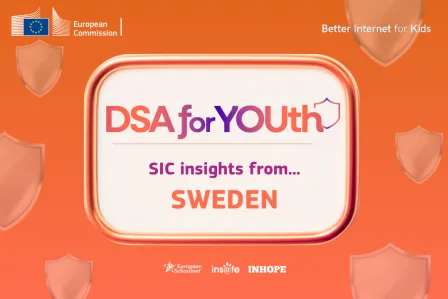This article is part of the campaign DSA for YOUth - Protecting minors by design, focusing on the DSA guidelines for the protection of minors under the DSA, including the age verification (AV) and age-appropriate (AA) measures, and translating these rules into clear, practical, and jargon-free resources. In this insight series, we explore how different Safer Internet Centres are working at the national level to raise awareness about the DSA and how it impacts the everyday lives of young people, their parents or caregivers, and teachers and educators.

Under the Digital Services Act (DSA), trusted flaggers are responsible for detecting potentially illegal content and alerting online platforms. They are entities designated by the national Digital Services Coordinators (DSCs). In this article, we learn more about the work of ECPAT Sweden, the hotline strand of the Swedish Safer Internet Centre, in its role as a trusted flagger.
In Sweden, ECPAT uses its trusted flagger its status to support children who reach out either through the ECPAT helpline for children or directly to ECPAT hotline. The hotline receives reports from the public about suspected child sexual abuse material (CSAM) or other sexually offensive content. Trained analysts carefully review and classify the material according to legal definitions and internal guidelines.
When a child contacts the helpline seeking help to remove material, helpline staff work closely with hotline analysts to ensure that all necessary information is collected for a report to the relevant platform. Each platform has its own requirements, so it varies in terms of what information is necessary, but typically it includes a URL, username or other identifier to help locate the illegal content is necessary.
Once all information is complete, the hotline submits a report to the relevant platform(s). After submitting the report, ECPAT closely monitors the case to see when responses are received, sending reminders if necessary. Following this, ECPAT files a police report and takes measures to prevent dissemination of any material that the child is concerned about that might be circulating online. Throughout the process, the child’s anonymity is carefully maintained unless the child chooses differently. Depending on the platform, action is typically taken within a few hours to a few days. When the child later contacts the helpline for an update, ECPAT can provide information about the progress of the case and any removal actions taken.
As the first organisation in Sweden to be granted trusted flagger status, ECPAT plays a key role in ensuring that illegal material of children is removed more swiftly from digital platforms, strengthening the protection of children online.
Interested in learning more about the DSA?
If you are interested in more, explore the DSA for YOUth toolkit to learn how the Digital Services Act (DSA) protects minors by design. There, you will find a family-friendly booklet explaining the DSA guidelines on what online platforms should do to keep kids and teens safe online, easy-to-read explainers, a quiz, and other resources.
Interested in learning more about activities in Sweden?
Find more information about the work of the Swedish Safer Internet Centre, including its awareness raising, helpline, hotline, and youth participation services – or find similar information for Safer Internet Centres throughout Europe.
This article is part of the campaign DSA for YOUth - Protecting minors by design, focusing on the DSA guidelines for the protection of minors under the DSA, including the age verification (AV) and age-appropriate (AA) measures, and translating these rules into clear, practical, and jargon-free resources. In this insight series, we explore how different Safer Internet Centres are working at the national level to raise awareness about the DSA and how it impacts the everyday lives of young people, their parents or caregivers, and teachers and educators.

Under the Digital Services Act (DSA), trusted flaggers are responsible for detecting potentially illegal content and alerting online platforms. They are entities designated by the national Digital Services Coordinators (DSCs). In this article, we learn more about the work of ECPAT Sweden, the hotline strand of the Swedish Safer Internet Centre, in its role as a trusted flagger.
In Sweden, ECPAT uses its trusted flagger its status to support children who reach out either through the ECPAT helpline for children or directly to ECPAT hotline. The hotline receives reports from the public about suspected child sexual abuse material (CSAM) or other sexually offensive content. Trained analysts carefully review and classify the material according to legal definitions and internal guidelines.
When a child contacts the helpline seeking help to remove material, helpline staff work closely with hotline analysts to ensure that all necessary information is collected for a report to the relevant platform. Each platform has its own requirements, so it varies in terms of what information is necessary, but typically it includes a URL, username or other identifier to help locate the illegal content is necessary.
Once all information is complete, the hotline submits a report to the relevant platform(s). After submitting the report, ECPAT closely monitors the case to see when responses are received, sending reminders if necessary. Following this, ECPAT files a police report and takes measures to prevent dissemination of any material that the child is concerned about that might be circulating online. Throughout the process, the child’s anonymity is carefully maintained unless the child chooses differently. Depending on the platform, action is typically taken within a few hours to a few days. When the child later contacts the helpline for an update, ECPAT can provide information about the progress of the case and any removal actions taken.
As the first organisation in Sweden to be granted trusted flagger status, ECPAT plays a key role in ensuring that illegal material of children is removed more swiftly from digital platforms, strengthening the protection of children online.
Interested in learning more about the DSA?
If you are interested in more, explore the DSA for YOUth toolkit to learn how the Digital Services Act (DSA) protects minors by design. There, you will find a family-friendly booklet explaining the DSA guidelines on what online platforms should do to keep kids and teens safe online, easy-to-read explainers, a quiz, and other resources.
Interested in learning more about activities in Sweden?
Find more information about the work of the Swedish Safer Internet Centre, including its awareness raising, helpline, hotline, and youth participation services – or find similar information for Safer Internet Centres throughout Europe.
- DSA (Digital Services Act) DSAforYOUth
Related content
- < Previous article
- Next article >













